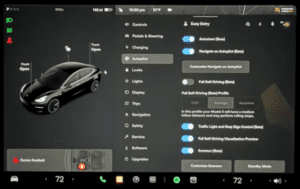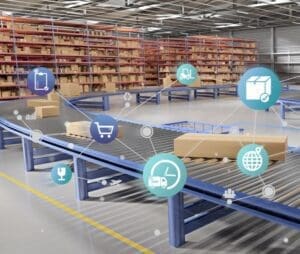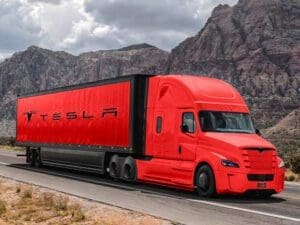 Not surprisingly, many CEOs have their share of secrets. For Tesla CEO Elon Musk, one of those secrets might be a driving mode that enables hands-free driving in Tesla vehicles. The hidden feature, aptly named “Elon Mode,” was discovered by a Tesla software hacker known online as @greentheonly. The anonymous hacker has dug deep into the vehicle code for years and uncovered things like how Tesla can lock you out of using your power seats or the center camera in the Model 3 before it was officially activated. After finding and enabling Elon Mode, @greentheonly ventured out to test the system and posted some rough footage of the endeavor. The hacker found that the car didn’t require any attention from them while using Tesla’s Full Self-Driving (FSD) software. FSD is Tesla’s vision-based advanced driver-assist system that’s in beta but is currently available to anyone who paid as much as $15,000 for the option. The software was the subject of an internally leaked report last month that indicated FSD has had thousands of customer complaints of sudden braking and abrupt acceleration. And now on to this week’s logistics news.
Not surprisingly, many CEOs have their share of secrets. For Tesla CEO Elon Musk, one of those secrets might be a driving mode that enables hands-free driving in Tesla vehicles. The hidden feature, aptly named “Elon Mode,” was discovered by a Tesla software hacker known online as @greentheonly. The anonymous hacker has dug deep into the vehicle code for years and uncovered things like how Tesla can lock you out of using your power seats or the center camera in the Model 3 before it was officially activated. After finding and enabling Elon Mode, @greentheonly ventured out to test the system and posted some rough footage of the endeavor. The hacker found that the car didn’t require any attention from them while using Tesla’s Full Self-Driving (FSD) software. FSD is Tesla’s vision-based advanced driver-assist system that’s in beta but is currently available to anyone who paid as much as $15,000 for the option. The software was the subject of an internally leaked report last month that indicated FSD has had thousands of customer complaints of sudden braking and abrupt acceleration. And now on to this week’s logistics news.
- Unionized UPS workers could strike this summer
- Walmart opens largest fulfillment center in Indiana
- Target tests larger next-day delivery effort
- Commerce Dept. funds $20 million supply chain resiliency push
- Food producers band together to face cyber threats
- Tesla issues another recall for its electric Semi
- Car dealer inventory is running low thanks to train shortage
 Unionized UPS workers voted overwhelmingly on Friday to authorize a strike, setting the stage for a potential work stoppage if the package delivery company and Teamsters can’t come to an agreement before their contract expires next month. The Teamsters said 97 percent of unionized workers voted for the authorization, which the union urged for in order to have more leverage during negotiations with the company. But a yes vote does not mean a strike is imminent. The Teamsters represent about 340,000 UPS employees, more than half of the company’s workforce in the largest private-sector contract in North America. If a strike occurs, it would be the first since a 15-day walkout by 185,000 workers crippled the company a quarter century ago. Teamsters General President Sean O’Brien has said:
Unionized UPS workers voted overwhelmingly on Friday to authorize a strike, setting the stage for a potential work stoppage if the package delivery company and Teamsters can’t come to an agreement before their contract expires next month. The Teamsters said 97 percent of unionized workers voted for the authorization, which the union urged for in order to have more leverage during negotiations with the company. But a yes vote does not mean a strike is imminent. The Teamsters represent about 340,000 UPS employees, more than half of the company’s workforce in the largest private-sector contract in North America. If a strike occurs, it would be the first since a 15-day walkout by 185,000 workers crippled the company a quarter century ago. Teamsters General President Sean O’Brien has said:
”If this multibillion-dollar corporation fails to deliver on the contract that our hardworking members deserve, UPS will be striking itself. The strongest leverage our members have is their labor and they are prepared to withhold it to ensure UPS acts accordingly.”
 Walmart opened its largest fulfillment center on June 15 outside of Indianapolis. The new 2.2 million-square-foot fulfillment center is 20 miles northeast of the city, located at 5259 W 500 N. in McCordsville. This next-generation facility will enable the retailer to fulfill more orders, more quickly. The fulfillment center is the second of four next-generation facilities that aim to bring the powerful combination of people, technology and machine learning together to achieve faster shipping and delivery, while increasing Walmart.com order fulfillment capacity. The fulfillment space of these sites is designed to expand access to the retailer’s next- or two-day shipping. Combined with the rest of Walmart’s fulfillment network, these next-generation facilities will enable the retailer to reach 95 percent of the U.S. population with its service. Walmart Fulfillment Services, Walmart’s end-to-end third-party fulfillment service, will also leverage the space to fulfill Marketplace items.
Walmart opened its largest fulfillment center on June 15 outside of Indianapolis. The new 2.2 million-square-foot fulfillment center is 20 miles northeast of the city, located at 5259 W 500 N. in McCordsville. This next-generation facility will enable the retailer to fulfill more orders, more quickly. The fulfillment center is the second of four next-generation facilities that aim to bring the powerful combination of people, technology and machine learning together to achieve faster shipping and delivery, while increasing Walmart.com order fulfillment capacity. The fulfillment space of these sites is designed to expand access to the retailer’s next- or two-day shipping. Combined with the rest of Walmart’s fulfillment network, these next-generation facilities will enable the retailer to reach 95 percent of the U.S. population with its service. Walmart Fulfillment Services, Walmart’s end-to-end third-party fulfillment service, will also leverage the space to fulfill Marketplace items.
 Target has a new way to speed packages to customers who live in the farther-out suburbs and neighborhoods of major cities, as it tries to give its e-commerce business a jolt. The big-box retailer said Wednesday that it is testing an extension facility that helps it get online orders to more shoppers the day after they click “buy.” It opened the first one last month in Smyrna, Georgia, about 16 miles northwest of Atlanta, and may open them in other cities. Drivers from Target-owned delivery service Shipt pick up packages from the extension facility and deliver them to customers’ doorsteps. The extension facility is part of Target’s effort to offer next-day delivery to more customers. Early this year, it said it would spend $100 million over the next three years to build a larger network of supply chain hubs to support the effort.
Target has a new way to speed packages to customers who live in the farther-out suburbs and neighborhoods of major cities, as it tries to give its e-commerce business a jolt. The big-box retailer said Wednesday that it is testing an extension facility that helps it get online orders to more shoppers the day after they click “buy.” It opened the first one last month in Smyrna, Georgia, about 16 miles northwest of Atlanta, and may open them in other cities. Drivers from Target-owned delivery service Shipt pick up packages from the extension facility and deliver them to customers’ doorsteps. The extension facility is part of Target’s effort to offer next-day delivery to more customers. Early this year, it said it would spend $100 million over the next three years to build a larger network of supply chain hubs to support the effort.
 By connecting small suppliers with wider industrial networks in a $20 million initiative, the Biden Administration hopes to make domestic supply chains more resilient and efficient, the federal government said. The money comes in the form of roughly $400,000 being sent to every state and Puerto Rico through the Hollings Manufacturing Extension Partnership (MEP), a program of the U.S. Department of Commerce’s National Institute of Standards and Technology (NIST), the Commerce Department said on June 9. The awards will support the creation of a database called the national Supply Chain Optimization and Intelligence Network (SCOIN) that will focus on providing supplier scouting services, establishing new service offerings to improve existing supply chain networks, filling gaps in the supply chain by connecting original equipment manufacturers (OEMs) with small and medium-sized manufacturers, and creating a complete map of U.S. supplier capability and capacity. Funding is provided by the CHIPS and Science Act of 2022, which authorized a pilot program of awards that would allow MEP centers to provide services focused on resiliency of domestic supply chains, workforce development, and adoption of advanced technology upgrades at small and medium-sized manufacturers.
By connecting small suppliers with wider industrial networks in a $20 million initiative, the Biden Administration hopes to make domestic supply chains more resilient and efficient, the federal government said. The money comes in the form of roughly $400,000 being sent to every state and Puerto Rico through the Hollings Manufacturing Extension Partnership (MEP), a program of the U.S. Department of Commerce’s National Institute of Standards and Technology (NIST), the Commerce Department said on June 9. The awards will support the creation of a database called the national Supply Chain Optimization and Intelligence Network (SCOIN) that will focus on providing supplier scouting services, establishing new service offerings to improve existing supply chain networks, filling gaps in the supply chain by connecting original equipment manufacturers (OEMs) with small and medium-sized manufacturers, and creating a complete map of U.S. supplier capability and capacity. Funding is provided by the CHIPS and Science Act of 2022, which authorized a pilot program of awards that would allow MEP centers to provide services focused on resiliency of domestic supply chains, workforce development, and adoption of advanced technology upgrades at small and medium-sized manufacturers.
 Food and agriculture companies in the U.S. face mounting cybersecurity threats, executives in the sector say, spurring them to formalize how they share information with each other. Hackers have targeted companies of all sizes and in all industries in recent years, particularly through ransomware strikes and data-extortion tactics. While many such attacks are opportunistic, with criminals often pouncing on holes in defenses where they can find them, security chiefs within the food supply chain worry that it could be a key target for more sophisticated hackers. Such attackers, who may be affiliated with nation-states, could have destructive intentions rather than purely chasing financial gain. Information-sharing on threats within the industry has been patchy. A specialist group within the Information Technology-Information Sharing and Analysis Center, which tracks threats across multiple industries, served as the primary avenue for intercompany intelligence since 2013. Last month, the IT-ISAC announced that the food and agriculture sector would finally be getting its own, dedicated platform. Similar groups already exist to enable companies in the financial services, retail, automobile and other sectors to exchange details about threats their peers should watch out for.
Food and agriculture companies in the U.S. face mounting cybersecurity threats, executives in the sector say, spurring them to formalize how they share information with each other. Hackers have targeted companies of all sizes and in all industries in recent years, particularly through ransomware strikes and data-extortion tactics. While many such attacks are opportunistic, with criminals often pouncing on holes in defenses where they can find them, security chiefs within the food supply chain worry that it could be a key target for more sophisticated hackers. Such attackers, who may be affiliated with nation-states, could have destructive intentions rather than purely chasing financial gain. Information-sharing on threats within the industry has been patchy. A specialist group within the Information Technology-Information Sharing and Analysis Center, which tracks threats across multiple industries, served as the primary avenue for intercompany intelligence since 2013. Last month, the IT-ISAC announced that the food and agriculture sector would finally be getting its own, dedicated platform. Similar groups already exist to enable companies in the financial services, retail, automobile and other sectors to exchange details about threats their peers should watch out for.
 Tesla issued another recall for its battery electric Semi, noting the door open warning indicator only displays when the vehicle’s parking brake is not engaged and the side door is not fully latched. The number of affected units (36) suggests that Semi production is still relatively low. This is the second recall for Tesla’s electric tractor. The first was issued in March for an electronic parking brake valve module (PVM), which the company said may fail to move into the park position when the parking brake is activated, increasing the likelihood of a rollaway and/or crash. At the time that notice was issued, the company recalled 35 affected units. Tesla Semi is equipped with a door closure warning system for its rear-hinged side doors that may be operated independently of other doors, according to the Description of Noncompliance. When the door closure warning system detects that a side door is not fully latched and the vehicle’s parking brake is not engaged, regardless of the vehicle’s ignition status, the system will display a notification on the vehicle’s touchscreen.
Tesla issued another recall for its battery electric Semi, noting the door open warning indicator only displays when the vehicle’s parking brake is not engaged and the side door is not fully latched. The number of affected units (36) suggests that Semi production is still relatively low. This is the second recall for Tesla’s electric tractor. The first was issued in March for an electronic parking brake valve module (PVM), which the company said may fail to move into the park position when the parking brake is activated, increasing the likelihood of a rollaway and/or crash. At the time that notice was issued, the company recalled 35 affected units. Tesla Semi is equipped with a door closure warning system for its rear-hinged side doors that may be operated independently of other doors, according to the Description of Noncompliance. When the door closure warning system detects that a side door is not fully latched and the vehicle’s parking brake is not engaged, regardless of the vehicle’s ignition status, the system will display a notification on the vehicle’s touchscreen.
The new car market isn’t quite yet out of the woods. Despite falling markups, rising inventory, and even some new car deals to be had, there’s a new challenge befalling automakers that has nothing to do with the cars themselves. A train car shortage has stranded some 70,000 cars that are ready to get shipped to dealer lots. The shortage doesn’t just affect automakers. It reportedly has been brewing for months and is now building into supply shortages for food and grain, according to the Detroit Free Press. Of the automakers affected, General Motors is one of the hardest hit, though the issue could spread across the industry if left to fester. It is apparently serious enough that auto industry lobbying groups and the Department of Transportation are investigating the issue and trying to preempt the bottleneck from getting smaller.
That’s all for this week. Enjoy the weekend and the song of the week, Signs by Tesla.

















